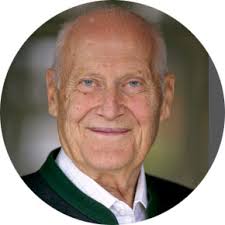Bert Hellinger

Was born in Germany in 1925. Bert Hellinger is probably the most innovative and provocative psychotherapist in Europe and best selling author psychotherapy. An ex-priest and missionary to the Zulus in South Africa for 16 years and an educator, a psychoanalyst body therapist, therapist dynamic group and a family therapist who brings a lifetime of experience and wisdom to work. Family constellations, which have become the hallmark of the approach Hellinge well as its observations on entanglement and systemic resolution, have touched the lives of thousands of people and have changed the way many professionals help carry out their own work.
Bert Hellinger has written 83 books. Translations of them are available in 30 languages. His work is documented on many CDs, DVDs, audiobooks and eBooks.
Bert Hellinger says that his parents and his childhood home were a major influence on his later work. His particular form of faith vaccinated against belief Family distortions of National Socialism. Because Hellingers repeated absences from meetings required by the Organization of the Hitler Youth and his participation in an illegal organization Catholic youth, he was eventually classified by the Gestapo on suspicion of being an enemy of the people ". As fate would have its exhaust the Gestapo was possible because of writing. Just 17 years old, became a soldier experienced the realities of combat, capture, defeat and life in a prisoner-of-war camp in Belgium with the allies.
The second major influence was certainly his childhood wish to become a priest. At age 20, he entered a Catholic religious order and began the long process of purification of body, mind and spirit in silence, study, contemplation and meditation. He came to spend 16 years in South Africa as a missionary to the Zulus, an experience that had a profound effect on his later work.
There he directed a large school, taught and was parish priest simultaneously. He eventually came to feel so comfortable with the Zulus as possible for a European. The process of leaving one culture to live in another sharpened awareness of the relativity of many cultural values.
Hellinger's participation in an interracial, ecumenical training in group dynamics led by Anglican clergymen was also tremendously influential.
Here they had a way of working with groups that valued dialogue, phenomenology, and individual human experience.
His decision to leave the religious order after 25 years concluded that the priesthood was no longer an appropriate expression of his inner growth.
Psychoanalysis and psychotherapy were to be the next major influence. Several therapeutic schools have left their mark on his work, along with dialogic orientation phenomenological group dynamics from the Anglicans, the fundamental need for human beings in addition to the forces of nature he learned from the Anglicans and the Zulu in South Africa, psychoanalysis he learned in Vienna, and the body - work he learned in America.
He trained in family therapy with Ruth and Leslie Kadis McCledon, and went on to work with Milton H. Erickson, and others. Those familiar with the full range of psychotherapy will recognize this approach in a unique integration of diverse elements. At the meeting of the powerful approaches of psychotherapy and other paradigms, it has created a unique and comprehensive approach to healing. He has learned the specific tools from a variety of sources, but the primordial force of his work comes from his refined ability to listen to the authority of a soul. This is not a 'technical' guaranteed, that is, rather, the only real protection we have against seduction by false authority according to Hellinger. To see 'what is' rather than blindly accept what is said - no matter by whom - is the focus of this often difficult work of healing for individuals, groups, communities and cultures.
Before taking to psychotherapy, who had studied philosophy and theology in Germany. Subsequently, he obtained the Diploma of Higher Education in South Africa where, for several years, he worked as a teacher and principal teacher training for Africans.
His particular way of seeing faith gave him all his family immunity against Nazism distorsionadasdel beliefs. Because of his repeated absences from meetings of the Organization of Hitler Youth and his participation in an (illegal) Catholic youth organization, he was classified by the Gestapo as' Suspected of being an enemy of the people ".
His escape from the Gestapo was paradoxically made possible when he was ambushed. With only 17 years, he turned soldier, experienced the realities of combat, capture, defeat, and was taken prisoner of war in Belgium. Hellinger had wanted to become a priest throughout his childhood. At age 20, already released, he entered a Catholic religious order and began the long process of silent purification of body, mind and spirit; studying, and meditating.
He lived 16 years in South Africa as a Catholic missionary to the Zulus. He ran a large school where he taught and was parish priest simultaneously. This experience also strongly influenced his work.
On his return to Europe, he trained in Gestalt therapy, he trained as a psychoanalyst in Vienna and Janov in primal therapy. Later it was dedicated to the Systemic Family Therapy and came into contact with the "original order" system, developed its own method of family constellations. The work of Milton Erickson had a great influence on his work, and finally included in its approach neurolinguistic Progaming.
This biography was obtained directly from Bert Hellinger Web page
